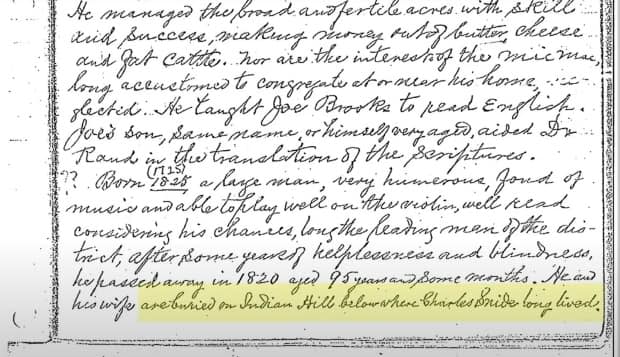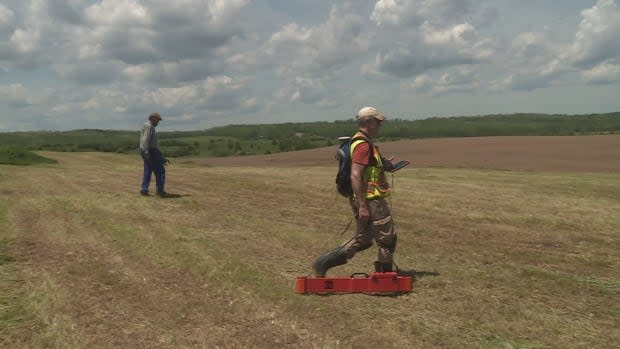No evidence found of unmarked graves related to Shubenacadie Residential School

WARNING: This story contains distressing details.
The team of researchers searching for evidence of unmarked graves at the former Shubenacadie Residential School in Shubenacadie, N.S., has concluded its search without finding graves connected to the institution.
A statement from Sipekne'katik First Nation Wednesday said while the crews did find evidence of unmarked graves, those graves pre-date the period of the residential school by about 100 years and are connected to former landowners.
Sipekne'katik Chief Mike Sack said he had mixed emotions about the results of the search.
"On one hand, I was very grateful that no children were recovered. And on the other hand, you know, I feel that there is something somewhere because a lot of our community members that are survivors are certain that people did go missing, that there are people there somewhere."

The search in Shubenacadie came following news of the discovery of the remains of hundreds of children at other residential schools in Canada.
The Shubenacadie Residential School operated from 1929 to 1967, and the building burned down years later. A plastics factory is now at the site.
The National Centre for Truth and Reconciliation lists the names of 16 children who died while at the institution. Survivors of the school have shared stories over the years about graves and burials at the site.
How the search was conducted
The researchers conducting the work found some potential explanations for reports of burials or graves.
Saint Mary's University archeologist Jonathan Fowler and Roger Lewis, a survivor of the school and a member of Sipekne'katik who is also an ethnologist and curator with the Nova Scotia Museum, led the search using historical documents, technological tools and cultural knowledge. The group posted a video explaining the process.
The team studied historical maps that pinpointed long-gone homes, sheds and barns that preceded the construction of the school, as well as aerial photos showing the school building, barn complex and staff residences of the Shubenacadie Residential School.
They also examined archival evidence, finding one document from the 1800s that references the burial site of Irish immigrants James and Sarah Ellis, who lived there in the late 1700s. The described location of the Ellis graves is in the same area where survivors of the school reported a burial site.

Fowler said that finding, along with the fact that the graves are very close to the driveway leading to the front of the school — where it would be difficult to create a clandestine burial site without being detected — make him believe the graves are not associated with the school.
Using ground-penetrating radar, Fowler and Lewis also found physical evidence that suggests the presence of graves there — something about 1.9 metres long and half a metre wide, buried about 70 centimetres below the surface. GPR is a technique that has been used at other residential school sites in Canada, and was used in searches at the former Shubenacadie Residential School site in 2019 and 2020.
They used LIDAR images — photos taken using lasers mounted on aircraft — that can reveal areas where the earth has been disturbed by human activity. The crew also deployed drones to create an extremely detailed digital map in which each pixel represents 2.5 centimetres on the ground.

Team members walked 79 kilometres doing an electromagnetic induction survey that measures the ground's ability to be magnetized and conduct an electric current. That type of survey can help discover things like buried ditches, field boundaries, pipes and the remains of buildings.
Fowler said while his team has concluded its work for now, he is willing to return to search more closely or in another area if someone comes forward with more information.
In a statement, Sack encouraged anyone with information to contact the band office.
"We know that people need closure and healing. We want our community and all Mi'kmaq people to know that we will re-open the search at any time if there is information that can provide further insights."

Support is available for anyone affected by their experience at residential schools, and those who are triggered by these reports.
A national Indian Residential School Crisis Line has been set up to provide support for residential school survivors and others affected. People can access emotional and crisis referral services by calling the 24-hour national crisis line: 1-866-925-4419.
Do you know of a child who never came home from residential school? Or someone who worked at one? We would like to hear from you. Email our Indigenous-led team investigating the impacts of residential schools at wherearethey@cbc.ca or call toll-free: 1-833-824-0800.
MORE TOP STORIES

